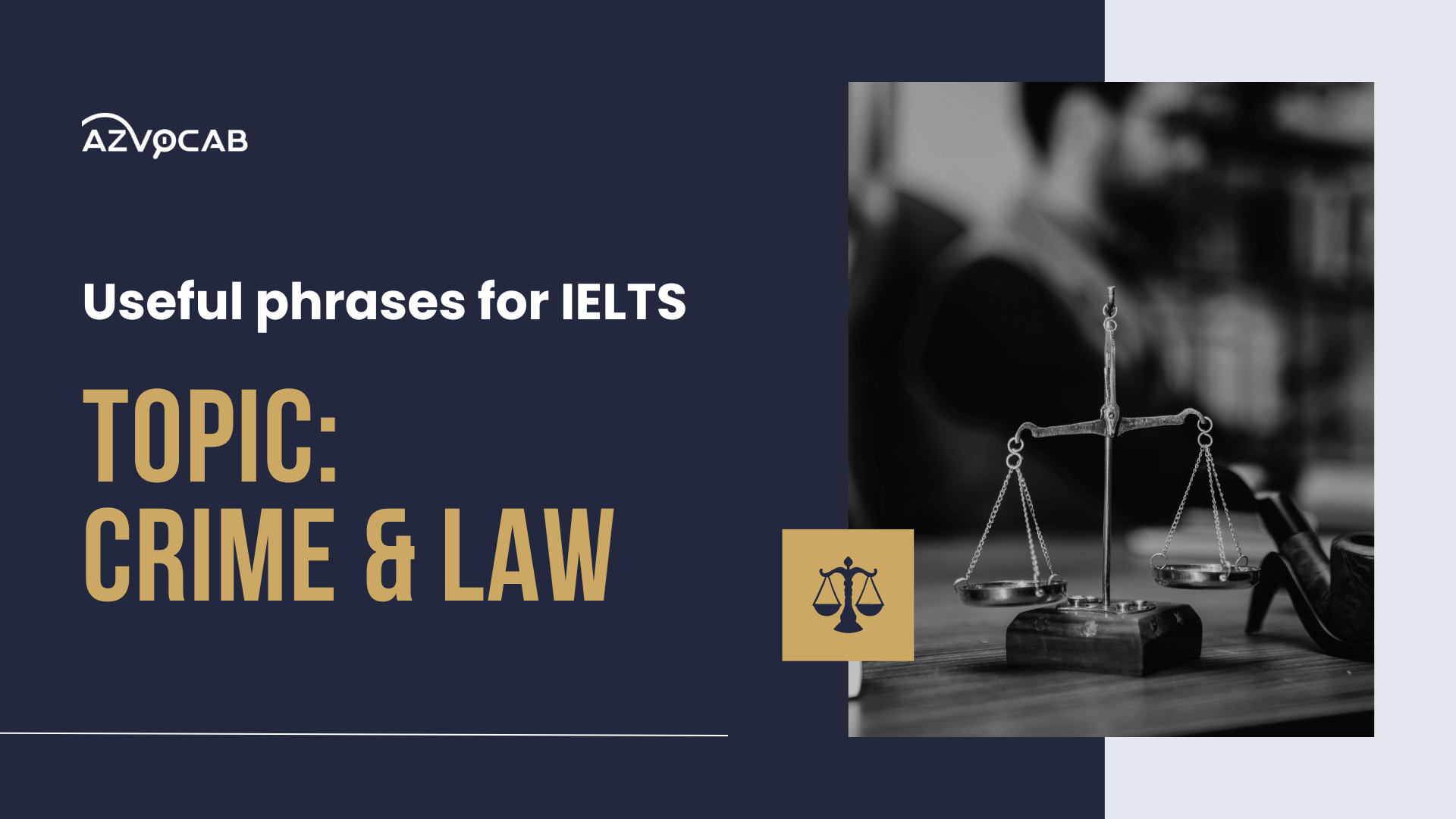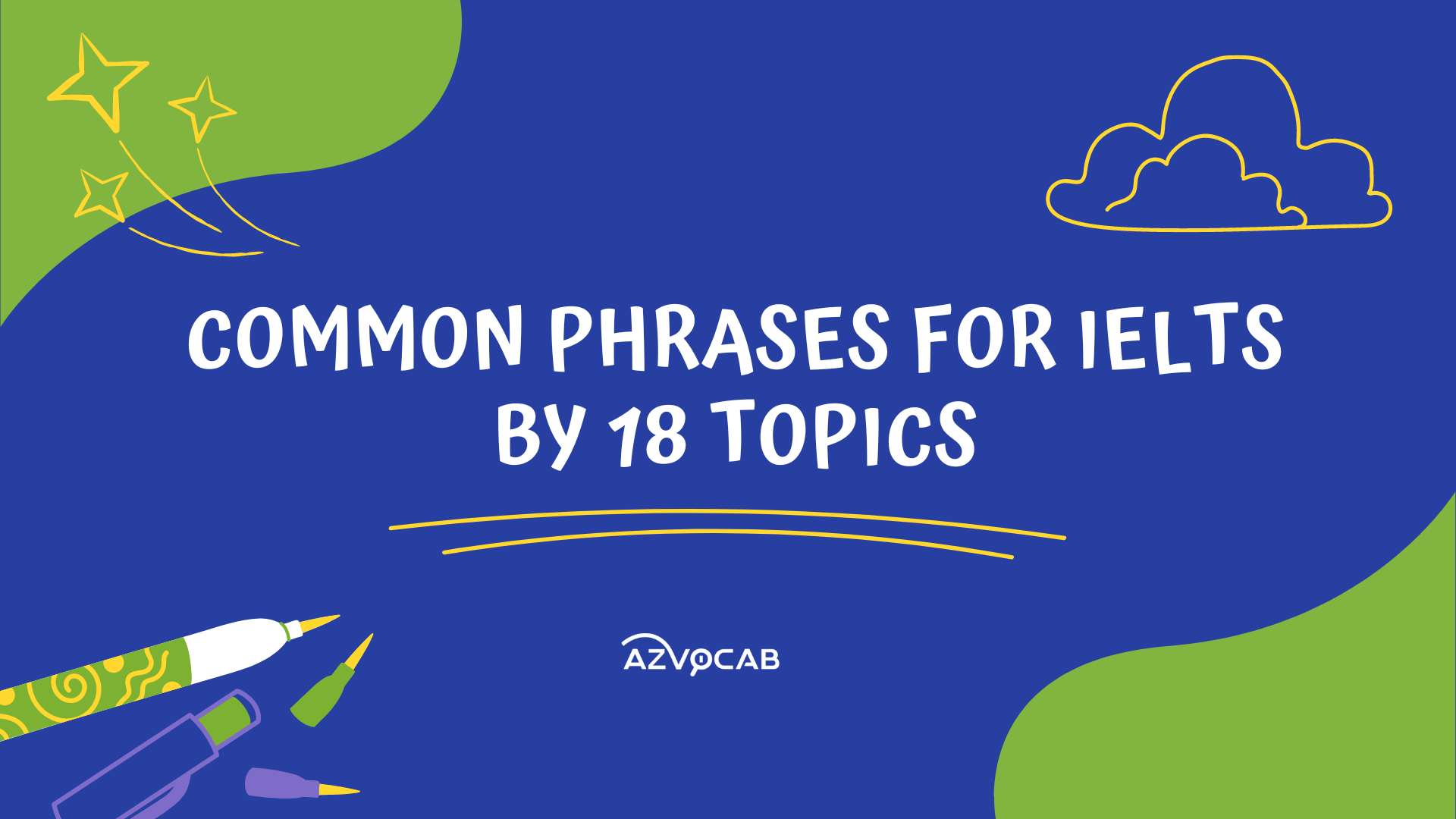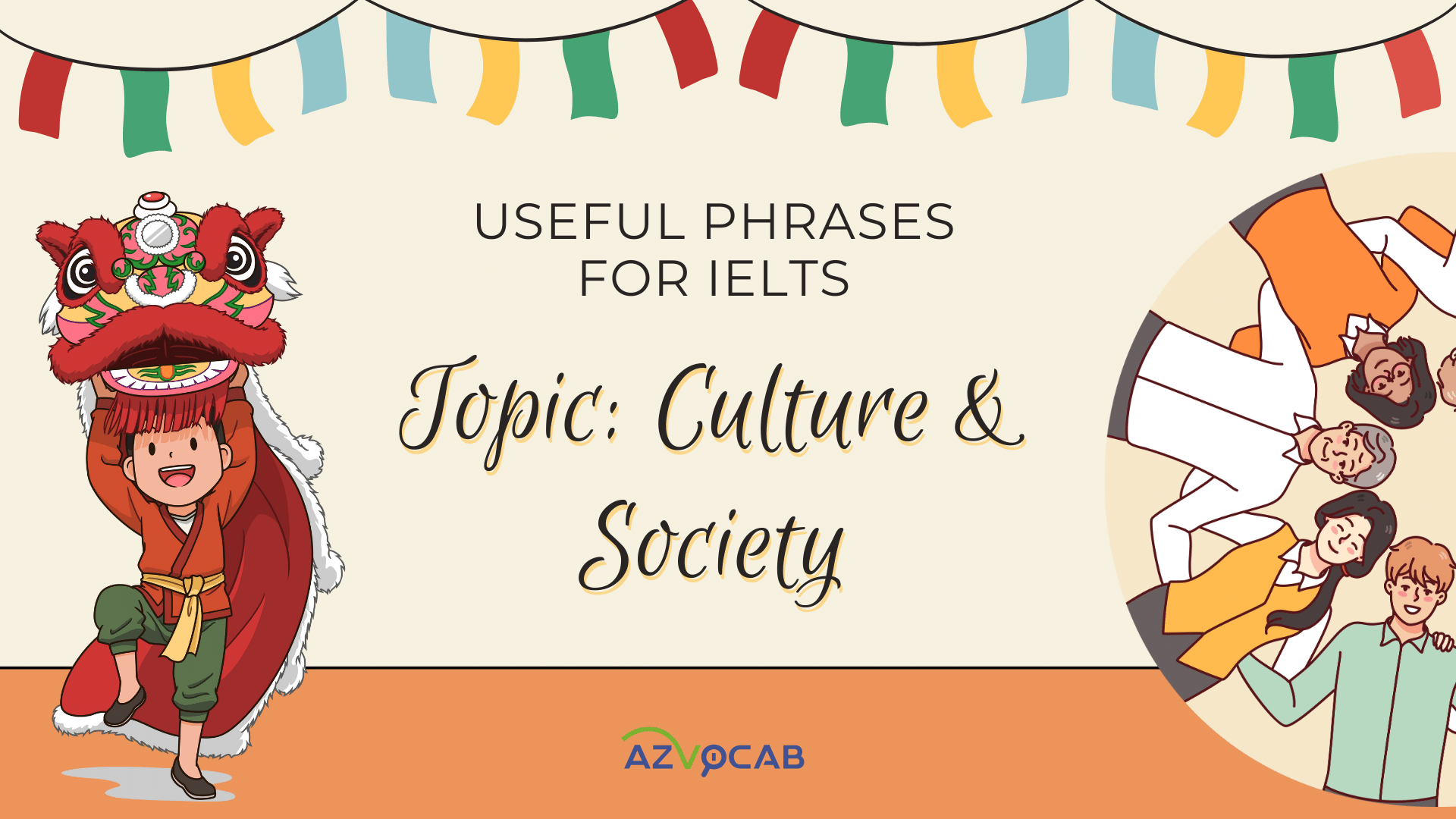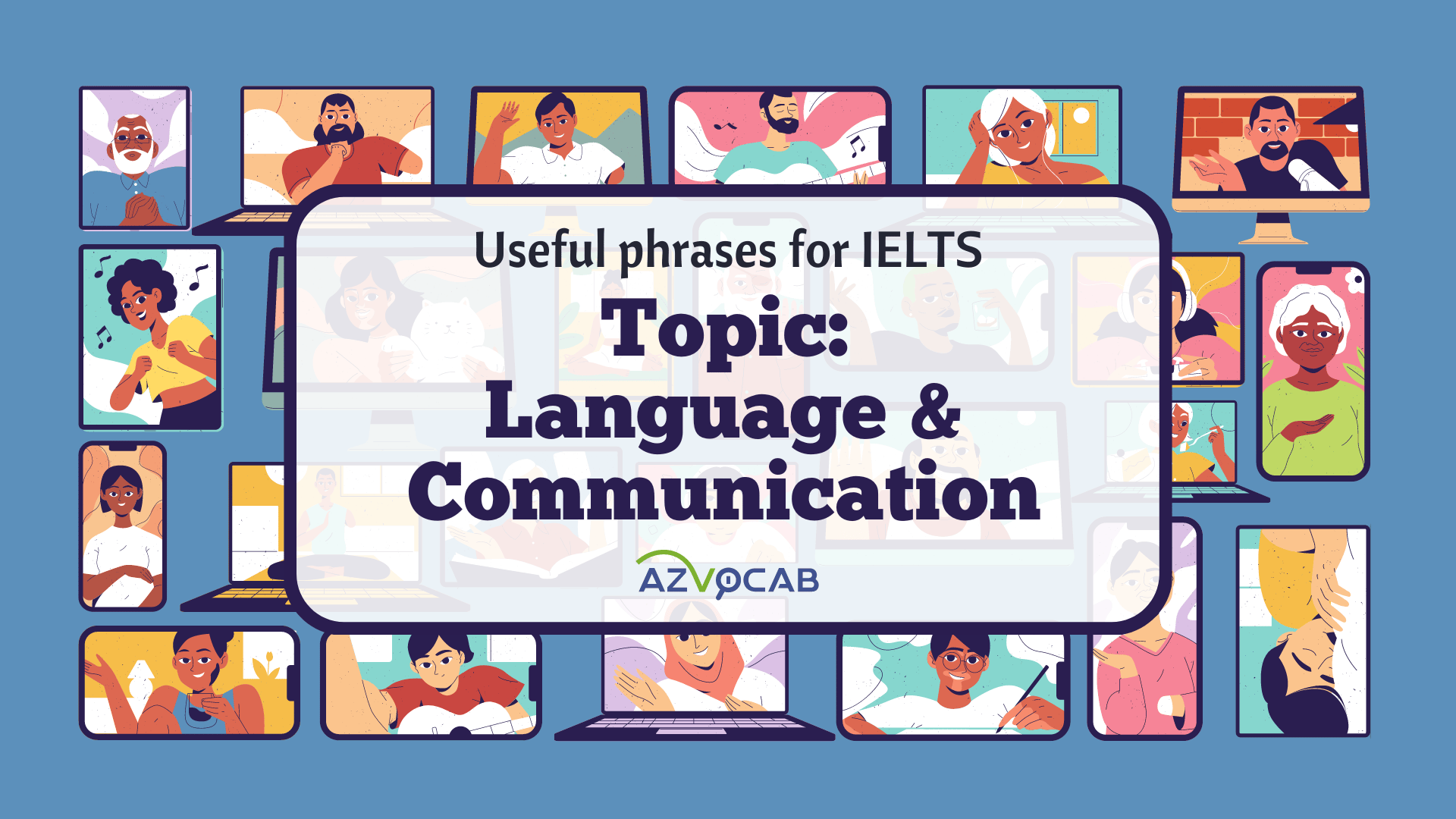The topic of Crime and Law is one of the most common topics in the IELTS exam. This is a familiar topic with many useful phrases. Below are the phrases related to the Crime and Law topic that azVocab has compiled for you.
| PHRASE | MEANING | EXAMPLE |
| Drinking/Drunk driving | the act of driving a vehicle after drinking too much alcohol | After 10 beers, William was arrested for drunk driving on his way home from the bar. |
| Running a red light | to pass through the traffic light when the red light is illuminated | He got pulled over for running a red light at one of the busiest intersections in the city. |
| Cyber criminals | individuals or teams of people who use technology to commit malicious activities on digital systems or networks | People should be wary of cyber criminals who hack into their computers illegally on a global scale. |
| Correctional facility | a jail, prison, or other detention facility used to house people who have been arrested, detained, held, or convicted by a criminal justice agency or a court | The purpose of the correctional facility was to try and teach prisoners to behave better and be less violent. |
| To enact/issue a law/regulation | to put a law/regulation into action | Maine was the first state in the Union to enact a law for prohibiting the sale of intoxicating liquors. |
| To uphold/enforce the law | to defend or keep a principle or law/ to make sure that people obey the law | It is the job of the police to uphold/enforce the law. |
| To engage in criminal activities | to take part in unlawful acts | Criminals felt emboldened to regularly engage in criminal activities. |
| To receive capital punishment | to receive the death penalty | In many countries, people who carry out drug smuggling will receive capital punishment. |
| To commit a crime = To commit an offence | to do something illegal | Those who committed a crime should be responsible for their wrongdoings. |
| To receive prison sentences | To be sent to prison | Friday morning, Lucifer Vincent Nguyen received a prison sentence of 545 months. |
| Life imprisonment | to be sentenced to stay in prison for the rest of one’s life, or for a very long period of time | We have life imprisonment without parole for kids in this country. |
| To impose severe punishments on sb | to punish someone severely | Imposing more severe punishments on those who commit driving offences can somehow help increase road safety. |
| To commit crimes as a way of making a living | to commit crimes because of having no other way of making a living | Many people commit crimes as a way of making a living due to their lack of money and become criminals such as burglars or robbers. |
| To be released from prison | to be set free or allowed to go | He was released from prison in 1854 and required to serve in the Siberian Regiment. |
| To pose a serious threat to society | create the threat of danger or harm to society | Drunken drivers pose a serious threat to other road users. |
| To put (sb) on a probation | to put a criminal to a period of time when he/she must behave well and not commit any more crimes in order to avoid being sent to prison | The judge put her on probation for a year. |
| To act/serve as a deterrent | to be something that deters people from doing something | Stricter penalties for unlawful activities would act as a deterrent for authorities to prevent potential criminals from committing crimes. |
| To be soft on crime | to accuse people or institutions of not giving out adequate punishment or forsaking their responsibility to crime victims by giving offenders more lenient sentences than they may deserve | Any politician who speaks out against the death penalty risks being branded soft on crime. |
| To be tough on crime | to establish stricter criminal penalties, especially as a reaction to violent and property crime | Countless presidents and prime minsters declaring as a platform they will be ‘tough on crime‘. |
| Crime prevention programmes | concentrated endeavors to modify, limit, or establish a habitual procedure within a crime prevention context | However, publicly financed amenities such as education, crime prevention programmes, transportation, and urban services (water supply, solid waste service, etc.) have also fallen as local financial resources have declined. |
| Juvenile crimes | crime committed by young people below a specific age (18 in most countries) | Juvenile crimes have been increasing recently. |
| Innocent people | people who are not guilty of a particular crime | Hundreds of innocent people will be unduly victimised. |
| Law-abiding citizen | citizen who obeys the law | The basic reason for having a police force in any nation is to protect the law-abiding citizen from the lawbreaker. |
| Law-abiding society | society that obeys and respects the law | In law-abiding societies, ordinary citizens are usually happy to obey the law. |
| A custodial/prison sentence | confinement in prison as a punishment imposed on a person who has been found guilty of a crime | Custodial sentences may only be imposed on adults who have committed an indictable offence. |
| To be wrongfully convicted | to be convicted of a crime that someone did not commit | For every eight people executed in the United States since the 1970s, one person has been wrongfully convicted and later exonerated. |
| To create a violent culture | to create a culture full of violence | Also, capital punishment can create a violent culture and encourage revenge. |
| To reintegrate back into the society/community | to integrate back into society/community following an injury or prison | On leaving prison in 2002, he founded the Philemon Foundation which began offering practical support as ex-offenders tried to reintegrate back into society. |
| Potential criminals | people who are likely to become criminals | Widespread surveillance in public areas would greatly contribute to crime reduction by deterring potential criminals from engaging in unlawful activities, when they know that security cameras are recording their every move. |
| A sense of safety and security | an ability to feel safe and being protected | This helps protect society from any threat and provides people with a sense of safety and security. |
| To violate/disobey/break the law | to refuse to do what someone with authority tells you to do, or refuse to obey a rule or law | The level of people violating the law is increasing. |
| To obey/abide by/comply with the law | to do what someone in authority tells you to do, or what a law or rule says you must do | The imposition of taxes has nothing to do with morality, and citizens have no other duty than to obey the law. |
| To raise people’s awareness | to make people conscious about a problem or issue | Sometimes police officers also take part in raising people’s awareness and understanding of how to protect themselves and their property. |
| Child abuse | behaviour in which adults intentionally treat children in a cruel or violent way | Japan handled record 130,000 child abuse cases in FY 2017. |
| Human trafficking | the crime of buying and selling people, or making money from work they are forced to do, such as sex work | Human trafficking is the process of trapping people through the use of violence, deception or coercion and exploiting them for financial or personal gain. |
| Drug trafficking | a global illicit trade involving the cultivation, manufacture, distribution and sale of substances which are subject to drug prohibition laws | Drug trafficking is a matter of considerable concern for the entire international community. |
| Petty crime | a type of crime that is not considered serious when compared with some other crimes | They got into trouble and began to get involved in petty crime. |
| White-collar crime | a nonviolent crime of deceit or concealment to obtain or avoid losing money or to gain a personal or business advantage | More and more money is made from international and commercial white-collar crime. |
| Tax evasion | the act of illegally avoiding paying tax liability | He felt that the best way to deal with tax evasion was to increase substantially the penalties. |
azVocab provided you with commonly used phrases related to the Crime and Law topic for the IELTS exam. Hopefully, after reading this article, you have gained various ideas and approaches for addressing this topic during the exam.
ielts
IELTS phrases
1561
Share






